Horror Baked In the Loam, Unfortunate Bathroom Breaks, Coming of Age in Hoodoo, Witches Giving Stitches, Demons Getting Into Construction, & A Revolution of Words - Reviews
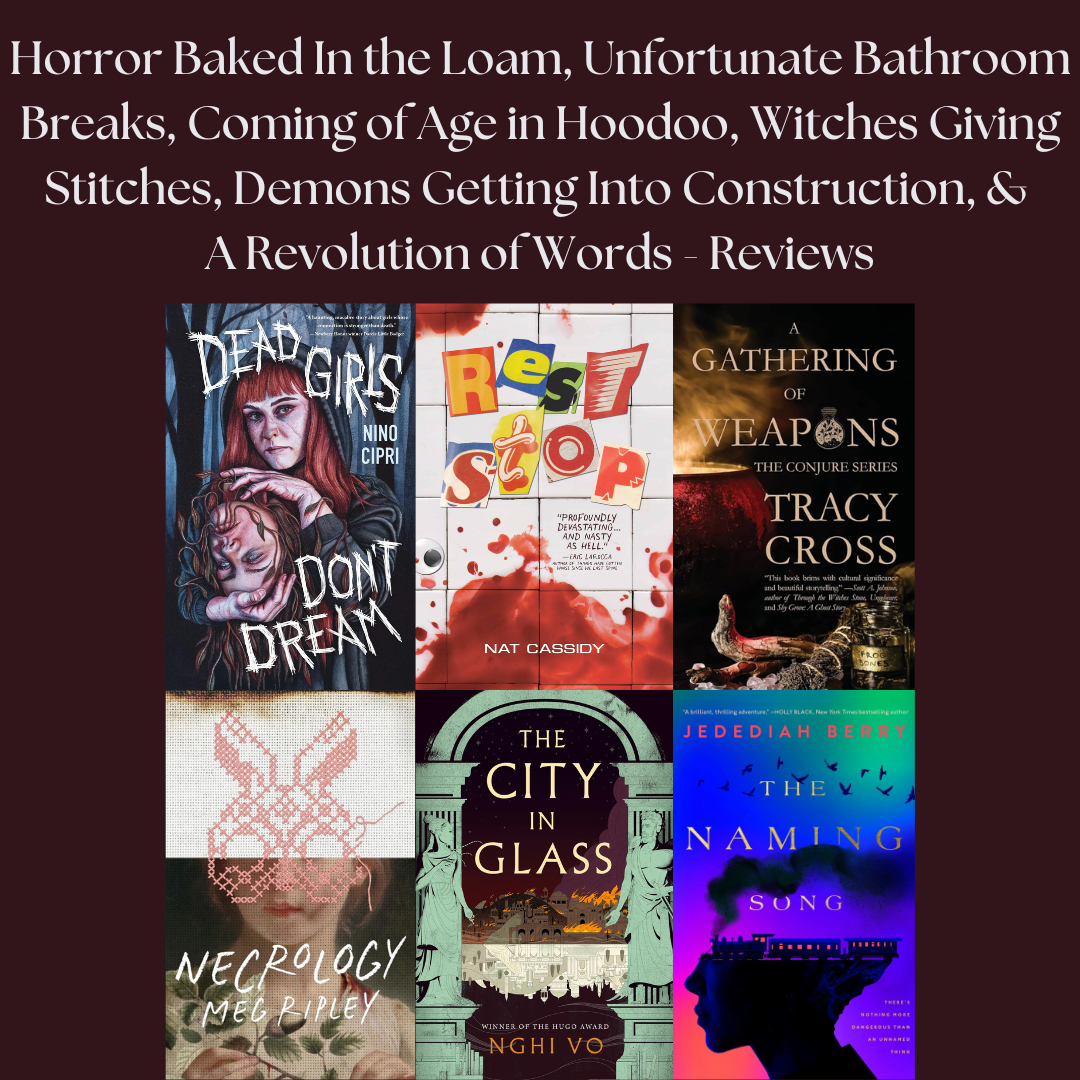
Hey everyone! It's your friendly neighborhood cyclone of emotions here, finally getting a minute to update with some reviews. Finding time lately has been a seemingly futile exercise in having excellent ideas but no actual time/energy/resources to flesh them out. I know I'm preaching to quite a selective choir–we're all kind of there right now–but it's been clawing at me more than usual, and it sucks.
So, in a bid to put some of these nasty thoughts at bay, here I am, once again, torn into pieces and writing about books I love.
Onwaaaaaaaaard!!!!
Dead Girls Don't Dream by Nino Cipri, Henry Holt & Co.
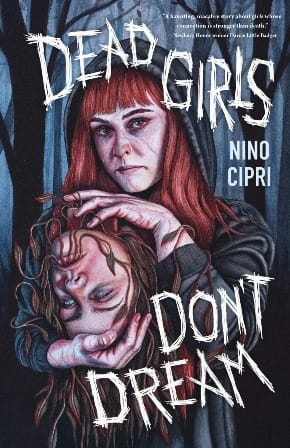
For those long following my Instagram, you'll have seen me post about Nino Cipri before. I am a rabid fan of their work and the ways in which it consistently shifts, never quite belonging in one genre or another. It's easy enough to call their writing speculative, yet to do so barely scratches the surface of what this insanely talented wordsmith is capable of conjuring.
With an astounding short story collection (Homesick) and two deliriously fun anti-capitalist sci fi horror novellas (Finna & Defekt) under their belt, I was ravenous for whatever would come next. It was earlier this year, when Cipri would post the announcement to their Insta, that we all became aware of Dead Girls Don't Dream, a YA horror novel set to release in November.
Fireworks were supposed to go off at this point but the damn machine is broken.
Dead Girls centers around a fictional set of woods, called Voynich Woods, as a potential nod to the mysterious Voynich Manuscript. In this book, however, it refers to a pair of sisters whose subsequent death and disappearance has lent to many a tall tale in the small town of our protagonists. Riley, a high schooler who along with her younger sister Sam lives with their uncle Toby, who himself is a staple of weird lore in town. Running a sort of Mystery Shack (for my Gravity Falls fans out there), Toby has been working on a book of the local folklore and superstitions, imparting the warnings and traditions of the woods to Riley and Sam alike.
On a fateful day, Sam's curiosity surrounding a famed mystical tree brings the girls deep into the forest where they not only find the legendary flora, but immense danger when Riley finds herself killed by a mysterious figure, plunging her into a nightmarish fight for her soul as she enters a realm beyond our own.
Madelyn lives on the outskirts of the woods with her controlling and disturbingly abusive mother. She's restricted from leaving their home, as well as ever using her magic, for good or ill. When Madelyn comes upon Riley's body, she makes a snap decision to save the girl and allows her passage back into the realm of the living, however, not without invoking the ire of her mother. What quickly becomes evident to both girls is their connection within the wider history of Voynich Woods and the supernatural happenings that surround it. What follows is Riley and Madelyn's fight to not only save each other, but the wider machinations of the magical wood itself.
There is so much to love within this emotional and terrifying story, but a major standout for me is part of the thematic makeup of our characters, specifically Riley. We quickly learn how Riley and Sam came to live with uncle Toby, their mother disappearing in the woods after a lifelong battle with addiction. This not only colors how the town views Toby, an enigmatic queer folklorist, but Riley as well. As soon as her transformation following her return begins, her reactions and anxieties are treated as an extension of her mother's previous actions in the cloistered community.
Though I've never much discussed it, I am intensely passionate about addiction and the demystification of our demonizing addicts in society as a tool of not only criminalization, but dehumanization of those who battle it, and the corporations who make money off of their battles. I witnessed first hand the destruction that heroin can wreak upon a persons life, relationships, and family, while also having to contend with our families conservative reactions toward our own.
This member of my family is probably the closest family member I have at this point in my life. We grew up together and my love for her is fiercer than any god damn law on this planet. When many abandoned her, I held on, because I knew she could make it out of the other side and as a nice big fuck you to the structures attempting to bring her down, she's several years sober and building an incredible family for herself.
Cipri's contextualization and handling of this incredibly complex subject is empathic and nuanced, detailing Riley's grief and hurt, but holding space for the struggles and healing of her mother in equal measure. To say I bawled toward the end of this book would be an immense understatement. The ways in which addiction and the larger folklore within the novel's world enmesh is seamless and crushingly beautiful, making way for a conversation not often had within YA or even horror spaces.
Dead Girls Don't Dream is absolutely horrifying, perfectly evoking the tone of haunted woods thematically, while simultaneously offering a tale wholly original and refreshing. For every scare there is even more heart, doing exactly what YA can do best, and will serve as an absolute resources for young people facing what Riley faces throughout the story. This fantastic novel comes out next week and I deeply implore you to give it your attention–ESPECIALLY if you love YA.
I want to thank Nino and the publisher for offering me an early audio copy of the book, with an incredible performance by Jess Nahikian. Nino has truly been a sweetheart over the past year in indulging my fandom and I cannot thank them enough.
Rest Stop by Nat Cassidy, Shortwave Publishing
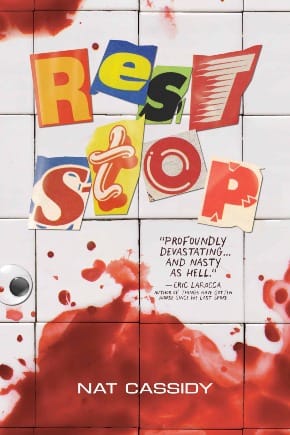
Just when we all thought Nat Cassidy could only disturb and torture us in longer-form work, he releases a short, but devastating little novella through indie horror juggernauts Shortwave Publishing. God dammit, Nat.
Rest Stop is many things. A road novel, a story of faith, every spider and snake hater's worst nightmare, a love letter to the Doobie Brothers, and, above all else, a disgustingly wet and completely unhinged slice of psychological horror. Calling to mind the premises of films such as Glorious and books such as ( ), the thrilling/horrifying events of the novel take place predominantly in the bathroom of a seemingly abandoned convenience store. Abe, a metal bassist with a heart of gold, is on a trip to see his ailing Bobbe, who he has never had a good relationship with. Wrestling with his own personal troubles, he decides to stop off and get some snacks and use the facilities before continuing his long journey.
Only once he attempts to leave the bathroom do things start going downhill. Fast. In a surreal turn of events, a massive spider, and later a dangerous snake, are lowered into the bathroom one after the other, testing Abe's sanity and endurance. All the while he receives bizarre notes constructed from cut up candy and snack wrappers, gleefully toying with him as he fends for his life in a cell of debauchery. And as though things couldn't get any conceivably worse, once he's released from the bathroom, he finds the entire convenience store doused in gore, guts, and dead bodies, while coming face to face with the bizarre killer responsible for making the entire place red.
From here matters only devolve faster, and the surrealism of Abe's predicament intensifies until the novella's breathless end. NATurally (hehehe), the tale is 410% Cassidy, holding much of the tell-tale features we have come to love from the thespian. From philosophical musings of faith and Jewishness alike, to mind-bending horrors that seem to make no sense, it all comes wrapped up in the tender/complex humanity ever present throughout his novels.
For folks maybe looking more in the direction of Nestlings rather than Mary, this one might not vibe as well, but if you simply love Nat Cassidy regardless of his temperament, Rest Stop is a disgustingly fun and fast read. Simply make sure you're not doubting your sanity before going into this one.
A Gathering of Weapons by Tracy Cross, Dark Matter & Dark Hart Series
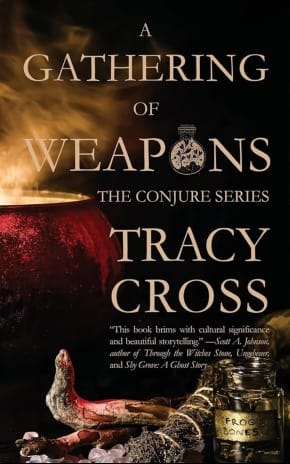
As many will remember from my super long Favorites list of last year–my deepest apologies, it's not going to be shorter in 2024–Tracy Cross's fantasy horror novella Rootwork was high on that list. A truly awe-inspiring magical gothic with a beyond memorable protagonist in Pee Wee Conway, a young girl whose empathic connection to hoodoo helped her to save her family from truly horrific forces.
Just last month we were excitingly gifted the much-anticipated sequel, A Gathering of Weapons, which kicks off four years after the events of the previous novella and presents a different Pee Wee than we perhaps grew used to in the beginning. Finding herself further coming into her powers, our heroine's confidence, as well as arrogance, additionally grows. Our empathetic Pee Wee still exists, but Cross presents the girl with the challenges of growing up, plus the decisions, choices, and responsibilities that come along with growing power.
Introduced into the mix is the ghost of an old Voodoo priestess, who promises Pee Wee lessons that will make her the most powerful spellcaster in all of Louisiana, recognizing the grief and hunger deep inside the girl. Along the way, she must contend with familial struggles, racist attacks, and what seem to be malevolent forces honing in on her growing powers. Will she ultimately join the priestess and the darker forces the woman serves?
Weapons offers a unique experience in which we witness a character we have come to love struggle with morality, community, and the pains of getting older and seeking the reverence of adulthood. There are moments where we don't entirely agree with Pee Wee, or the actions she chooses to make. At fourteen, she definitely is butting up against that teenage arrogance that has her believing she knows better, serving as an excellent juxtaposition with Rootwork's characterization and setting the stage for her growth in the final installment. For every scene of stubborn anger comes a tender and heart-wrenching moment that brings her back to equilibrium.
While perhaps not as horror as its predecessor, Weapons is a stupendous addition to the Conjure universe. It almost feels like a "calm" before the inevitable storm of its conclusion, and no matter how prepared or unprepared we may be for what comes by the end, we know Cross will do so with breathtaking nuance and care. If you're looking for a fantastically fleshed-out magic system steeped in well-researched and inhabited folklore, Tracy Cross's Conjure Series is unlike anything you've read before, or may read ever again!
Necrology by Meg Ripley, Creature Publishing, LLC
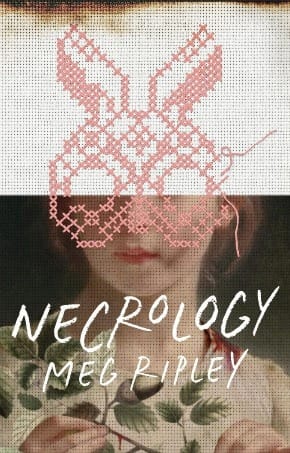
Speaking of incredibly fleshed-out magic systems, we HAVE to talk about Meg Ripley's debut, Necrology.
First of all, look at this cover. Immaculate. Zero notes. I first learned of Meg through our mutuals in the community and upon learning of this book, jeepers was I excited. Necrology is an alternate history speculative horror following a pact made between the witches of Salem and what the men of that time were calling themselves Freemen. In an attempt to further control women without (as frequent) violence enacted upon them, the pact agrees that Dirty women–those who actively practice the magic they are born with–will no longer actively participate in magic or connect to the Dirt, therefore Freemen will "no longer" hunt and kill witches. Thus the compact is signed and hands are dusted off.
However, those of us living in contemporary society know this was never the end of Puritanical power-grabbing or desire to control the bodies of women and queer people en-masse.
We fast-forward a few generations to find young Rabbit and Rook playing a game of Sixty-Three, which is a part of the magic system for spellcasting, particularly for forming and delivering curses. Rabbit is one of our predominant characters throughout the story, and being this is the first in a series, likely who we will be following quite a bit. Rook is a young man (debatable) who is sympathetic to the Dirty cause, having an adept connection to the Dirt and spends much of his time aiding and working with Rabbit and Whitetail, the witch who runs the orphanage they all reside in.
I joke about Rook's maleness, but as someone who has read many stories about trans eggs waiting to break, Rook's apparent drawing toward the Dirt, rejection of the ways of the Freemen, and bristling when Rabbit points out his maleness–the proverbial call is coming from inside the fucking house, is all I'll say. Granted, this is my personal speculation, and nothing Ripley has spoken directly to. As a cisgender author, I would never look to place words in her mouth, but if you read the book and keep a close eye on Rook's character...well you'll see.
ANYWAY. The two youngsters are playing this particular game because the proprietor of their orphanage, a Jonathan Andrews, or as the children call him, The Beard, is on his way to visit the home. It quickly becomes obvious this man is not someone the children or Whitetail enjoy dealing with, as the Beard has made several unwanted advances toward Whitetail, demanding marriage in return for his allowing their living in the house. What generates further anxiety is Whitetail's noticeably pregnant belly, blackening hands, and recent growth of antlers atop her head.
For Whitetail is not pregnant with child, but currently housing the spirit of her rebellious sister, Hyena, whose actions in trying to steal the precious Necrology marble led to a fire that killed the parents of the children living in the orphanage. Whitetail feels the best way she can protect the children from Hyena's reckless plans for war is to harbor her within her body, but doing so is causing her painful transformation. And, obviously, a patriarchal man looking for her hand in marriage will not take kindly to an obvious pregnancy.
Thus, Rabbit and Rook are working to curse the Beard in an attempt to keep him away, but in a moment of childish stubbornness, Rabbit refuses to complete the game, therefore creating an imbalance within the wilds, which results in "mud," or unfortunate events. Beard makes his arrival, and following a harrowing and unsurprising attack upon Whitetail, Hyena takes over her body and smashes the Beard in the head with a skillet. As he tries to escape and bring authorities back to capture the house, Rabbit unwittingly unleashes a curse that kills him immediately, leading the coach driver to escape with his body.
Naturally, this leads to immense trouble and adventure, as much of this takes place within the first 50 or so pages out of close to 400. What follows is the beginning of a passionate and fiery fight for autonomy, becoming, and authenticity as Rabbit is brought into the heart of Freemen territory by Jonathan's father. It is here in which her worst fears and anxieties are realized and plans are revealed to destroy the compact between Dirty and Freemen, calling for the extermination of all Dirty women.
Nothing can adequately prepare you for this book. Part fantasy origin, part folk horror, all anti-colonial feminism, Ripley has a lot to say and does so eloquently and fiercely. There is darkness at the heart of its narrative, yet it refuses to give itself wholly to this darkness, harnessing it as a vehicle for hope that we can still bring our ideologies back from the clutches of white supremacy. Each character has their unique growth, struggles, and becoming as they confront complex truths and fight for balance in a completely unbalanced world.
The history Necrology offers may be speculative but much like her contemporaries and forebears, Ripley holds our past, present, and future accountable, offering a way forward–if only we choose to heed the call of the wilds.
The City in Glass by Nghi Vo, Tordotcom
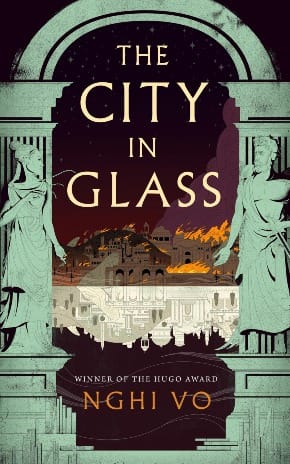
Arrogant, was Vitrine's first thought, that they would walk so mighty through the world. Demons learned humility with their first mouthful of dirt, their first mouthful of blood, and angels had never learned it at all.
Pg. 10-11
It's an excellent feeling when many of your favorite authors release books in the same year. Stressful, yes, because it can be hard to give all of them the attention and time you wish to, but I'll be goddamned if I don't try my best. We were blessed with TWO releases this year from Hugo award winner Nghi Vo. Another entry in her sublime Singing Hills series, and this breathtaking standalone novel, The City in Glass.
Set in the fictional city of Azril, this burgeoning and relatively peaceful metropolis is overseen by a demon by the name of Vitrine. She loves the city, consistently interacting with its denizens and taking part in the daily minutia. On the night of their harvest festival, amidst the revery and contemplation, tragedy strikes when a band of angels come to Azril and destroy the entirety of the city and its denizens, but not before Vitrine can get her own attack in and cursing these seeming enforcers of faith.
Though she is forced to the depths of the sea, Vitrine does rise once again to grieve her decimated city. Only she is not the only soul left, as one of the angels to receive her curse has been exiled by his brothers, as he now harbors a piece of Vitrine that has tainted him. Now seemingly connected, Vitrine wants nothing to do with the angel as she begins to earnestly attempt rebuilding her city, taking us back to the most impactful memories of her decades there.
What follows is a multi-generational odyssey focused on the rise, fall, and rebirth of empire, the sins we carry with us forever, the love one can feel for a place that becomes their home, and so much more. It is a gorgeous critique of empire and faith, much in the ways Vo has become famous. Vitrine is as compelling and flawed as one can imagine a demon, but its Vo's restructuring of what makes a demon that makes our journey alongside her so ethereal.
An interesting aspect of the story is this book has been sold as a romance, though whether this is between Vitrine and the angel, or Vitrine and the city of Azril, is not wholly clear. I went into the book expecting romantasy done the Nghi Vo way, but it is in no way what anyone may expect. Throughout the majority of the book, Vitrine wants absolutely nothing to do with the angel. She even sends him away for thousands of years at one point. While toward the end, it becomes apparent that there is a form of love that seems to grow between them, it is not a heavy focus of the narrative. Rather, the focus remains with Vitrine's grief and growth as she rebuilds her beloved home. It was a pleasant surprise, as well as a queering of the ways we expect romantic stories to play out in fiction.
For longtime readers of Vo, The City of Glass will feel like a warm and welcoming hug–a charming and enchanting trip through a world only possible through her eyes. For any first time readers, this is a story that pairs well with the works of Madeline Miller, Caro de Robertis, and many more, but with that nice added layer of subversion and critique to challenge you as you read. I cannot recommend her enough.
The Naming Song by Jedediah Berry, Tor Books
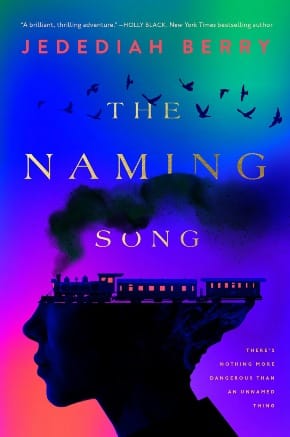
I am going to do my best to describe and sell this book to you, but be warned: it truly is something that must be experienced and valiantly resists classification. And I say this as an endorsement.
Earlier this year I received a bound manuscript for this book from Tor. I had no earthly clue what it was, but it sounded really cool upon first read of the synopsis, so I kept the ARC. It unfortunately kept falling behind other upcoming titles, and one day, I saw Gennarose Nethercott post about the book. I was immediately arrested by the cover and quickly realized this was the book I was sent months ago. With Nethercott's glowing praise I became all the more excited to dig into this enchanting tale.
Then moving happened. Then life happened. Then suddenly it was release day and I still hadn't given this book the attention it deserved.
So, in a bid to hold myself accountable, I bought the audiobook with one of my Libro.fm credits and set to listening, going in as unaware of the plot as possible. Guided by the warm and rich song of Marisa Calin's stunning narration, I entered the beguiling and awe-inspiring world of Jedediah Berry's The Naming Song.
To characterize this novel as a fairy tale doesn't feel like enough. It feels as much a fairy tale as it does a fable. Similarly to the contextualization of folklore and myth Nethercott deployed in Thistlefoot, Berry presents an entirely new way to view our history and future, as the time-frame of this tale is not always clear. Some moments point to cars as technology of old, yet the use of trains feels so classical and antiquated. It's almost like the memes of It Follows that pop up every couple of years, trying to decode what year the film takes place in due to the seemingly futuristic shell reader.
Whether it be past, future, or present, this existence is built by the power of naming, and by extension, the power of linguistics. Our central protagonist is an unnamed courier who delivers the words that eventually help the Named to further understand their world. It presents an almost utopian device with which to contextualize our world, as it saves the denizens from the words we relate to the destabilization of our contemporary society. Yet, utopias do not and should not exist, as we learn of a class of Unnamed people who are seen as the enemies to the Named. They are often characterized as monsters, with many of the creations of this world's magic being viewed as such because they are constructed from the emotions and hopes of the creator.
Very quickly it becomes evident that much like our current reality, there are very real power imbalances within this society. Our courier has only ever known this world, as she is tasked with delivering the words given to her by her forebears, much of her existence taking place on train cars traveling between the different towns. When several Unnamed attacks cause the courier to become separated and, by extension, hunted by those she once swore allegiance to, she is forced to search for the truth as she holds a particularly destabilizing word in her possession–one seeming to have caused much of this destruction.
It is along this journey where she meets a roving group of performers called the Black Square who claim to hold the true and unfiltered stories of the making of the world. It becomes clear that the Black Square is a revolutionary group existing outside of the Committees the courier is used to, as well as how much her past has informed her view of the Named and Unnamed.
I loved this book...SO MUCH. I am an absolute floozy for linguistic-based magical systems, as well as the very basic set-up of how the world operates. Yet make no mistake, this simplistic approach is merely a ruse, as the book becomes far more expansive and complex once the courier leaves the comfortable confines of the Committees and Sayers. Berry constructs a world both allegorical and wholly unique, featuring tropes that feel at home in The Wizard of Oz, Lord of the Rings, and even–to a far cheerier extent–Snowpiercer. It's a novel completely aware of and complimentary to the influences that came before it. It seriously considers the power of words and the responsibility we hold when we use the words we do, whether it be for power, harm, healing, etc.
Brimming with mystery, fantasy, and some of the most compellingly unique imaginings of ghosts and golems, The Naming Song is another title conjuring the nostalgic feeling of classical fairy and folk tales, yet carrying the responsibility of assisting its readers in imagining more than what exists before us. Berry has written a revolutionary text that honestly belongs on many a college syllabus, if for no other reason than to prompt necessary discussions missing in academic social justice spaces. I can only implore you to allow this tale to wrap you up in its textured quilt, allowing it to whisk you to an imagination that just may save your life.
Goodness gracious! Thank you to those who gave their time to this piece. I cannot rave about this books enough, and my hope is you give any of them your time and love.
Things are starting to slow down a smidge bit, so I'm hoping to get more pieces done, including several that are LONG overdue at this point.
I did want to let everyone know that this month I will be hosting and speaking with Vincent Tirado on the 22nd, over at Doylestown! I'm so excited, as Vincent's adult debut We Came to Welcome You is one of my favorite books of this year. If you want to talk about the structural horror of white supremacy and horror tropes, we're going to have a QUEER OLD TIME!!
Stay safe and reading, y'all. And as always, Free Palestine.




